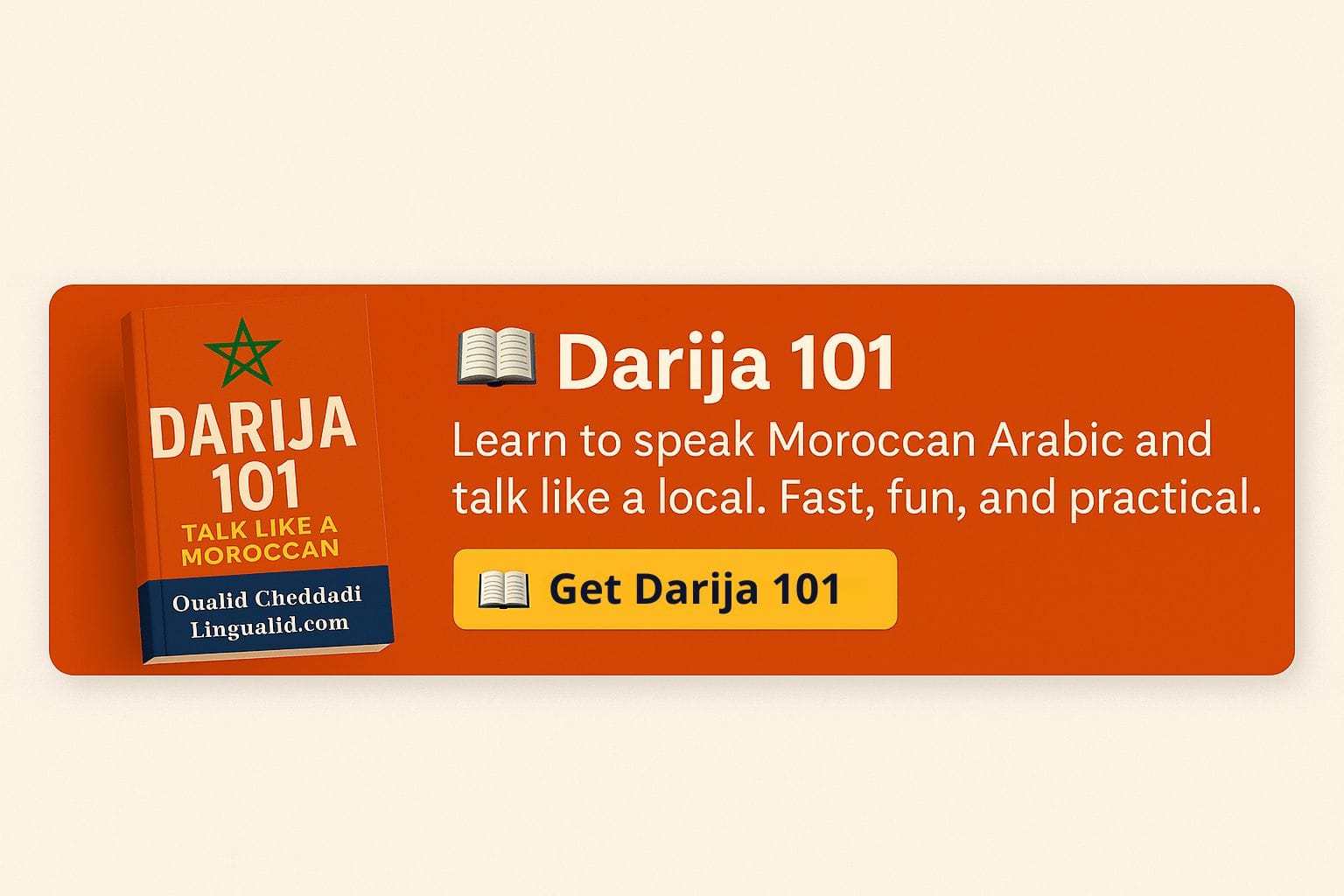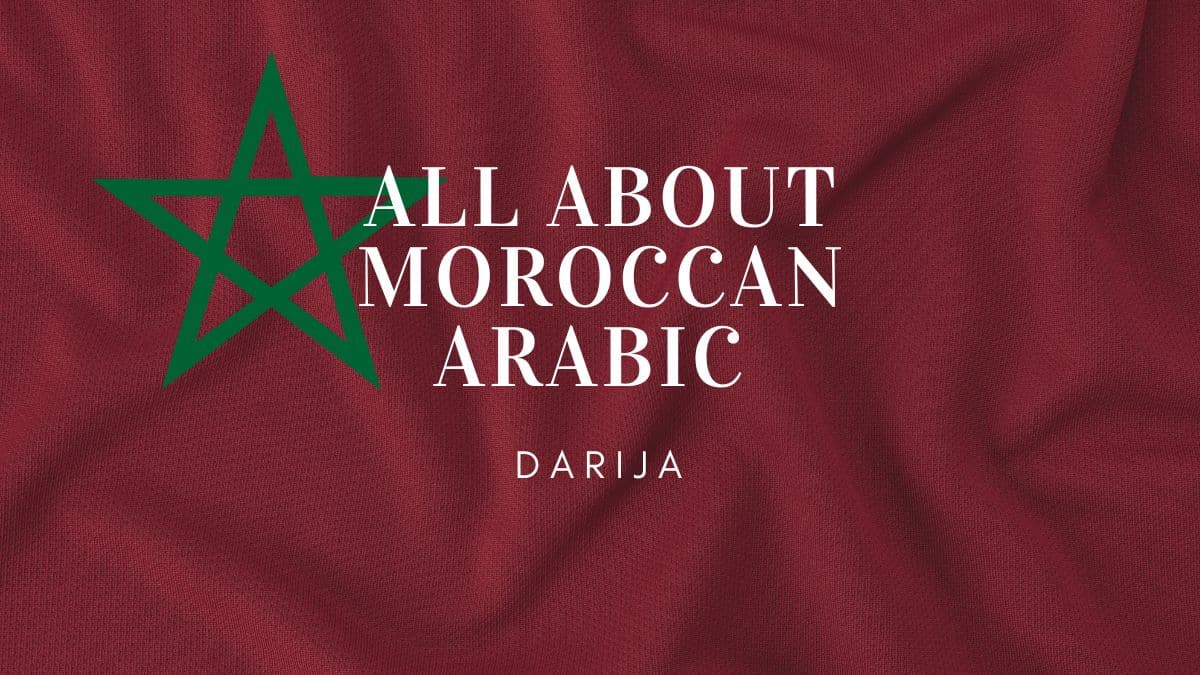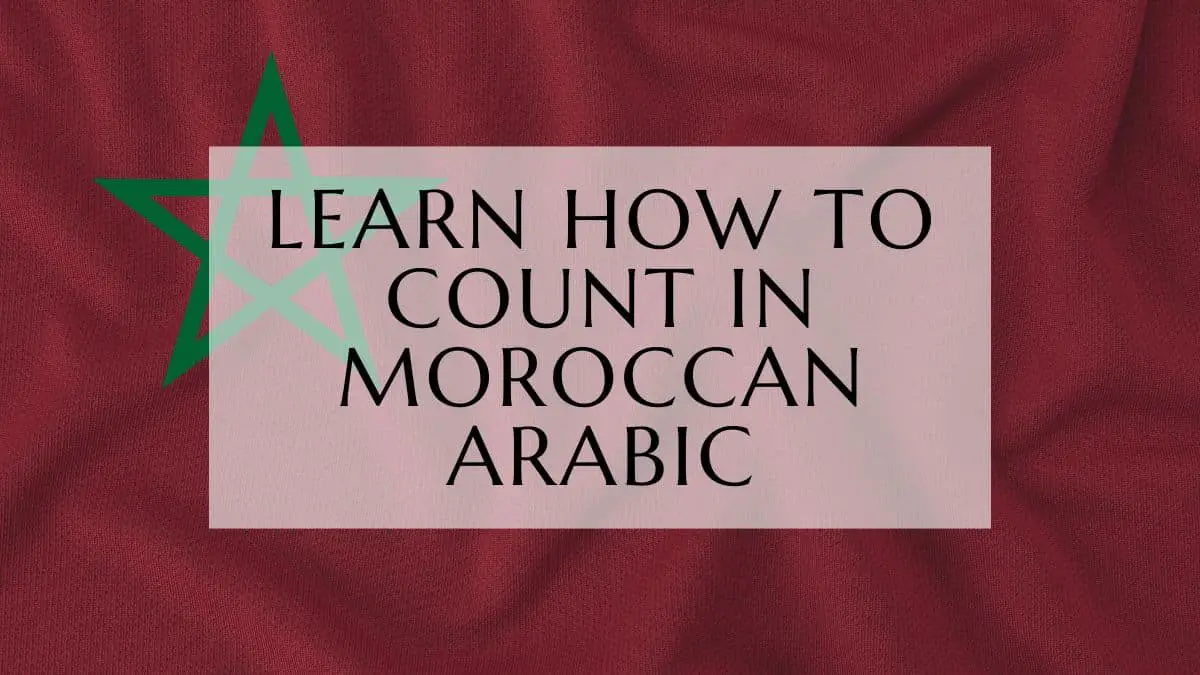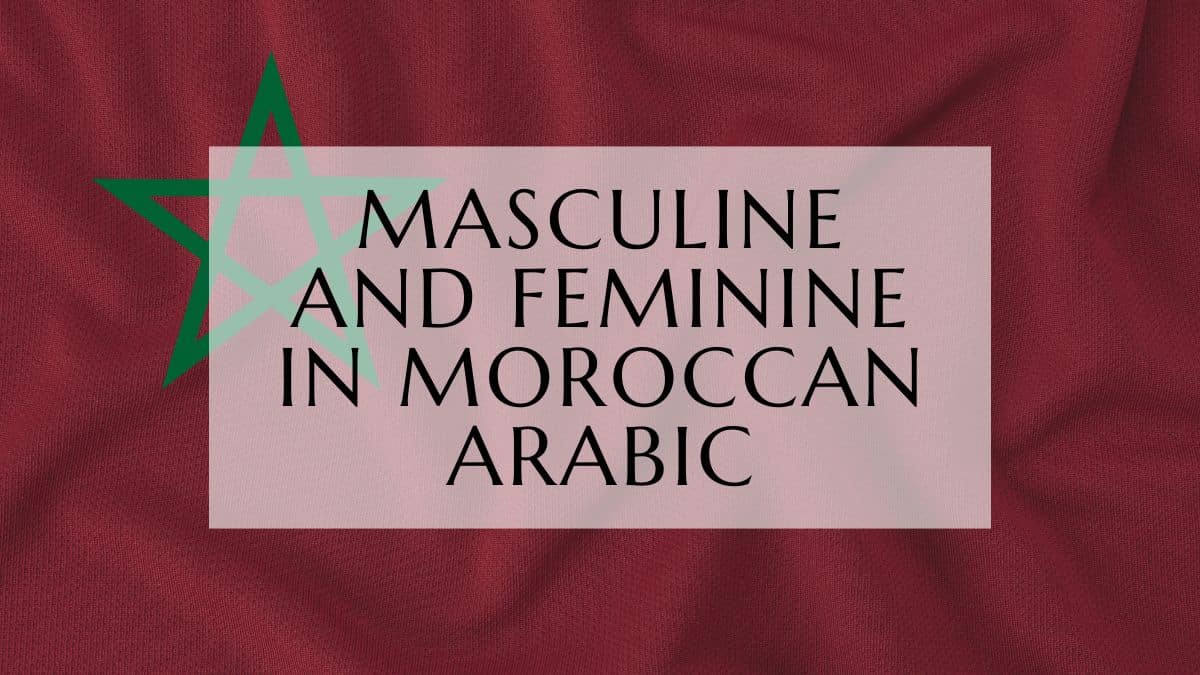Expressing your حب (hob / love) in Moroccan Arabic can be exciting and full of passion. This guide will show you how to say “I love you” in Moroccan Arabic. You’ll learn phrases like كنحبك (kanhabbak / I love you) and كنبغيك (kanbghik / I love you), as well as romantic expressions for your شريك (partner). It doesn’t matter if you’re just starting out, in a serious علاقة (relationship), or deeply عاشق (in love). This article will give you the right Moroccan Arabic عاطفة (affection) to share your deepest مشاعر (feelings).
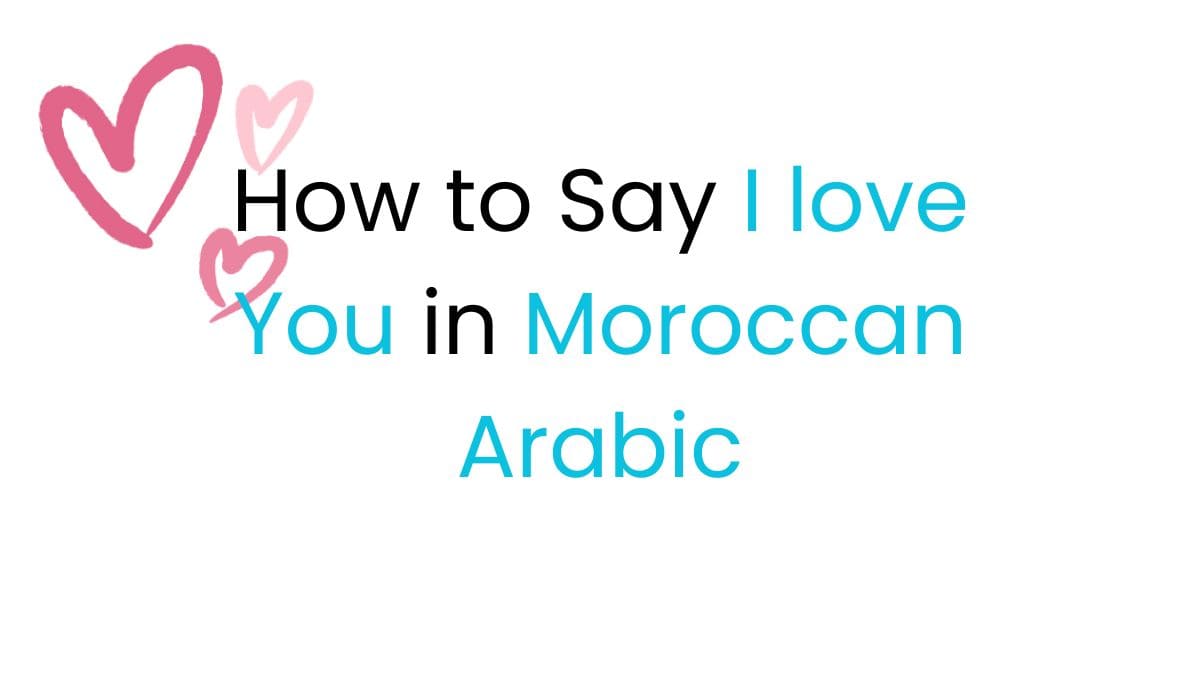
Common Ways to Say “I Love You” in Moroccan Arabic
The Moroccan Arabic language has many ways to express love and affection. كنحبك (kanhabbak / I love you) and كنبغيك (kanbghik / I love you) are two common phrases for saying “I love you.” They have different meanings and are used in various situations.
كنحبك vs كنبغيك
كنحبك (kanhabbak / I love you) is a casual way to show you care, often for friends, family, or in casual relationships. It means “I want you” and shows love and concern. On the other hand, كنبغيك (kanbghik / I love you) is a deeper, more passionate way to say “I love you.” It’s usually for serious relationships.
Moroccan Arabic Expressions with كنبغيك
Using كنبغيك (kanbghik / I love you) in Moroccan Arabic can express deep romantic feelings. Here are some examples:
- كنبغيك بزاف (kanbghik bezzaf / I love you so much)
- كنبغيك كتر من كلشي (kanbghik ktar men kolshi / I love you more than anything)
- كنبغيك حتى للقمر و كتر (kanbghik 7tta l lqamar w ktar / I love you to the moon and back)
- كنبغيك بكل قلبي (kanbghik b kol qalbi / I love you with all my heart)
Moroccan Arabic Sayings with كنحبك
كنبغيك (kanbghik / I love you) is for deep romantic feelings, but كنحبك (kanhabbak / I love you) is for many other relationships. Here are some ways to use كنحبك (kanhabbak):
- كنحبك بحال صاحب (kanhabbak bhal sa7b / I love you as a friend)
- كنحبك كيما نتا/نتي (kanhabbak kima nta/nti / I like you just the way you are)
- كنحبك بزااف (kanhabbak bzaaf / I love you a ton)
These sayings show love, care, and appreciation for those close to us.
Expressing Love to a Romantic Partner
When you want to tell someone you care, Moroccan Arabic has many beautiful phrases. From the simple “كنبغيك” (kanbghik / I love you) to deeper words, these love expressions in Moroccan Arabic let you share your feelings deeply and truly.
Ways to Say “I Love You” to a Boyfriend, Girlfriend, or Spouse
“كنبغيك” (kanbghik / I love you) is a common way to say “I love you” in Moroccan Arabic, but there are more. Try “نتا/نتي نصي التاني” (nta/nti nossi tani / you’re my other half), “نتا/نتي التوأم ديالي” (nta/nti taw am dyali / you’re my soulmate), or “نتا/نتي الحب ديال حياتي” (nta/nti lhob dyal hyati / you’re the love of my life)” to show deep love. For something more casual, “نتا/نتي كلشي بالنسبة ليا” (nta/nti kolshi bnsba liya / you’re my everything) works well too.
- كنبغيك: I love you (strong, committed love)
- نتا/نتي نصي التاني: You’re my other half
- نتا/نتي التوأم ديالي: You’re my soulmate
- نتا/نتي الحب ديال حياتي: You’re the love of my life
- نتا/نتي كلشي بالنسبة ليا: You’re my everything
These phrases are great for telling a boyfriend, girlfriend, or spouse how much you care. They show the real and deep feelings you have for them.
I Love You in Moroccan Arabic
In Moroccan Arabic, “كنحبك” (kanhabbak / I love you) and “كنبغيك” (kanbghik / I love you) both mean “I love you.” But they have different meanings and are used in various situations. Knowing the difference between these phrases helps Moroccan Arabic speakers show their love in the right way.
“كنحبك” (kanhabbak / I love you) is a casual way to say “I love you.” It’s often used with family, close friends, or in the beginning of a romance. It shows you care and are fond of someone, but not as deeply as “كنبغيك” (kanbghik / I love you).
“كنبغيك,” however, is a deeper way to say “I love you.” It’s for serious, long-term relationships, like with a spouse or life partner. This phrase means a strong, intense love.
Choosing between “كنحبك” (kanhabbak / I love you) and “كنبغيك” (kanbghik / I love you) depends on how deep your feelings are and the relationship’s stage. “كنحبك” is good for casual or family settings. “كنبغيك” is for deep, devoted love.
| Phrase | Meaning | Context |
|---|---|---|
| “كنحبك” | I like you / I care for you | Casual, used among family and friends, early stages of a romantic relationship |
| “كنبغيك” | I love you (deeply) | Serious, committed romantic love, typically used in long-term relationships |
The choice between “كنحبك” (kanhabbak) and “كنبغيك” (kanbghik) shows how deep your feelings are and fits with Moroccan culture. By knowing these differences, Moroccan Arabic speakers can show their love in a way that feels right to others.
Showing Platonic Love in Moroccan Arabic
In Moroccan Arabic-speaking cultures, love goes beyond just romantic relationships. People often show affection to family, friends, and others in special ways. These expressions of love show the strong bonds in Moroccan Arabic-speaking communities.
To show حب للعائلة (hob l l3aila / love for family), saying “كنبغيك يا ماما” (kanbghik ya mama / I love you, mom) or “كنبغيك يا بابا” (kanbghik ya baba / I love you, dad) is common. Saying “كنبغيكم كاملين” (kanbghikom kamlin / I love you all) also shows love for friends and close groups.
The phrase “كنحبك بحال صاحب” (kanhabbak bhal sa7b / I love you as a friend) is a sweet way to say التعبير عن حب افلاطوني (ta3bir 3n hob aflatoni / express platonic love) in Moroccan Arabic. It shows deep friendship and affection without the romantic feelings of “كنبغيك” (kanbghik / I love you).
Using the Moroccan Arabic language lets people build strong connections and feel a deep sense of belonging. Whether it’s about family, friends, or the special value of each person, Moroccan Arabic has many ways to express platonic love.
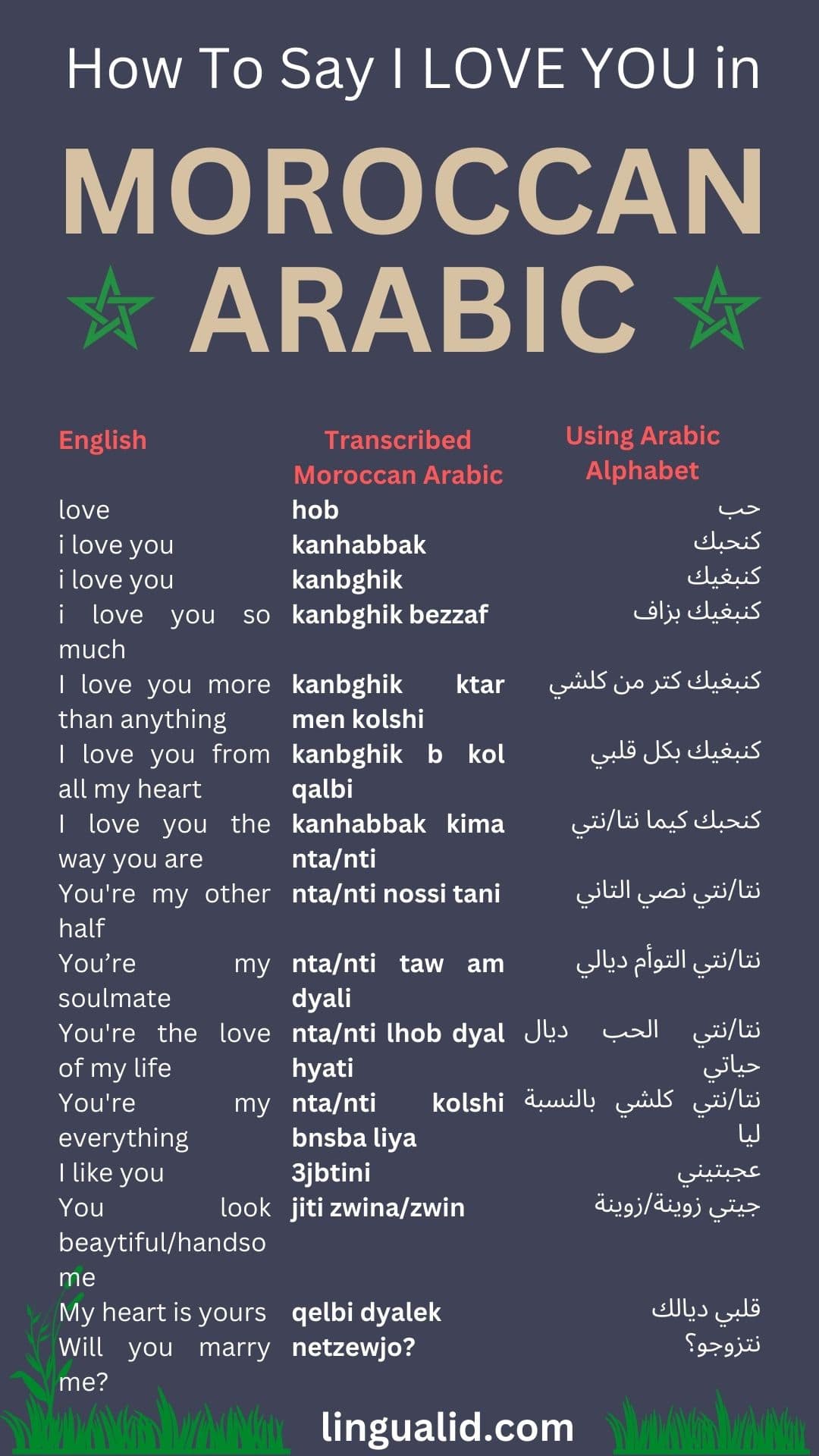
Romantic Moroccan Arabic Phrases for Specific Situations
When you’re just getting to know someone, use casual, playful ways to show affection in Moroccan Arabic. Phrases like “كتجي معايا” (katji m3aya / I like you), “عجبتيني” (3jbtini / I like you), and “جيتي زوينة/زوين” (jiti zwina/zwin / you look beautiful/handsome) are great. They help show your interest and set the stage for deeper feelings.
In a committed relationship, you can express more passionate love. Phrases such as “كنبغيك” (kanbghik / I love you), “نتا/نتي كلشي بالنسبة ليا” (nta/nti kolshi bnsba liya / you’re my everything), and “قلبي ديالك” (qelbi dyalek / my heart is yours) show deep love. These Moroccan love phrases can make your bond stronger.
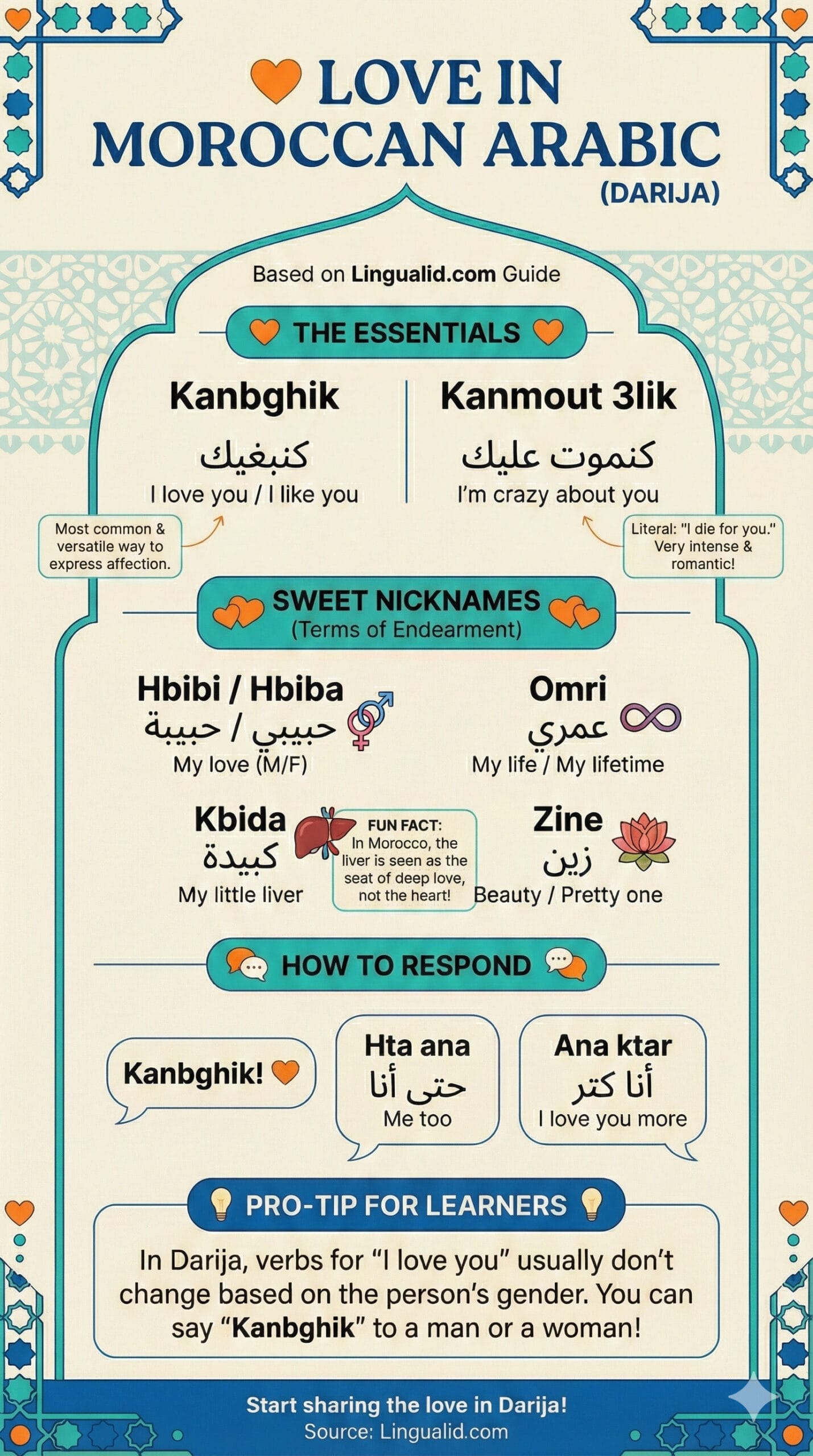
When You’re Engaged
Being مخطوبة (mkhotoba / engaged) means showing deep love in Moroccan Arabic. Phrases like “عندك قلبي كامل” (3ndak qalbi kaml / you have all my heart) and “قلبي كيضرب غير عليك” (qalbi kaydreb ghir 3lik / my heart beats for you) show your commitment. Saying “نتا/نتي الحب ديال حياتي” (nta/nti lhob dyal hyati / you’re the love of my life)
is a big statement of devotion.
The biggest romantic phrase is “نتزوجو؟” (netzewjo? / Will you marry me?). It’s a powerful way to express your love and commitment.
| word | transcribed | meaning |
| نتا/نتي حبي | nta/nti hobi | you’re my love |
| نتا/نتي روحي | nta/nti rohi | you’re my soul |
| نتا/نتي الحب كلو | nta/nti lhob kollo | you’re the whole love |
| الحب براسو | lhob braso | love itself |
| حياتي | hyati | my life |
| عمري | 3omri | my life |
Cultural Context of Expressing Love in Moroccan Arabic
Phrases like “كنبغيك” (kanbghik) and “قلبي” (qalbi / my heart) show how important love is in Moroccan Arabic-speaking areas. Knowing this helps you use Moroccan Arabic love phrases the right way.
Learning Moroccan Arabic can be for many reasons, but mastering love phrases makes connections stronger. Moroccan Arabic has many ways to say “I love you,” from “كنحبك” (kanhabbak) to “كنبغيك” (kanbghik). It’s important to know these differences for better communication.
Expressing love in Moroccan Arabic is full of passion, tradition, and respect for emotions. By diving into this culture, you gain a deeper understanding of Moroccan Arabic. This can lead to stronger bonds with the Moroccan community.
Oualid Cheddadi is the founder of Lingualid, a platform that inspires independent language learners worldwide, regardless of the language they are learning. The name “Lingualid” is derived from the Portuguese word for “language,” “língua,” and the last three letters of Oualid’s name, “Lid.”

